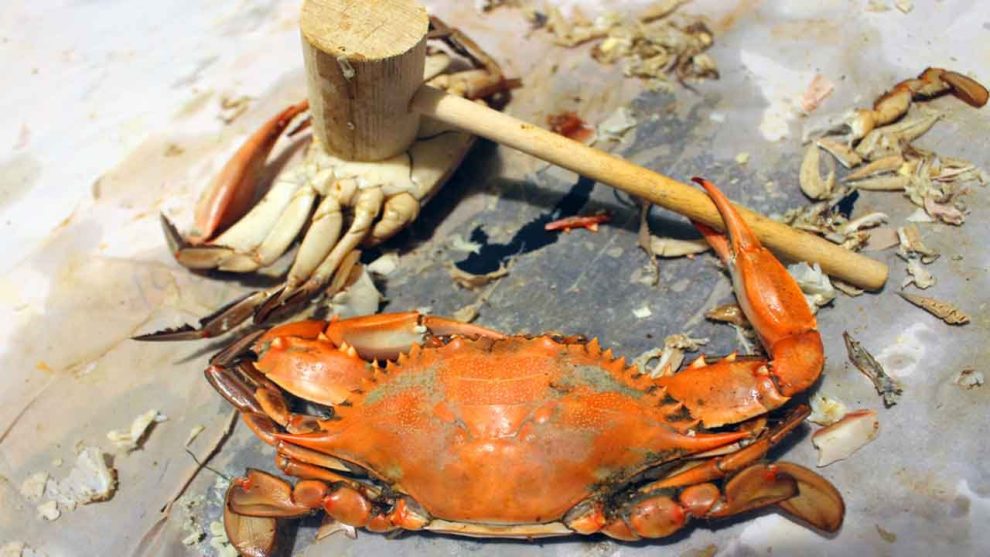TAILS pulled off while conscious, killed without first being humanely stunned and limbs removed or mutilated – these are just some of the common ways live decapods are routinely treated according to a new report from Crustacean Compassion.
These and others welfare concerns are highlighted in the ‘Sea-to-Plate Welfare Report’, a report which provides a detailed review of the “Sea to Plate” journey experienced by decapods, from capture to eventual slaughter.
The report was authored by Crustacean Compassion and Dr Julia Wrathall highlighting at each stage the welfare compromises experienced, relevant scientific information, and recommendations to ensure welfare and species-specific needs are met.
Each year in the UK more than 420 million crabs, lobsters, nephrops (also known as langoustines) as well as prawns and shrimp are landed by UK vessels into UK ports. A further five billion prawns and other decapod crustaceans are also imported into the UK annually. This results in more than 48 thousand tonnes of prawns, shrimps, nephrops and crabs sold by UK retailers alone each year, with a retail sales value of more than £670 million.
Dr Ben Sturgeon, Chief Executive Officer (CEO) at Crustacean Compassion said: “It is anticipated this report and associated extensive references will be a vital resource for industry leaders and legislators to work further on this issue resulting in more appropriate protection and humane treatment.

“The focus of this report has been the Sea to Plate journey for decapods in the UK but the recommendations, and science which underpins them, could be applied to settings globally.”
The rise of public interest in aquatic animal welfare and the progress made on decapod crustacean welfare science over recent years resulted in decapod crustaceans being recognised as sentient animals for the first time in UK legislation. Their inclusion in the Animal Welfare (Sentience) Act 2022 was celebrated as a vital step forward for both decapods and animal welfare in the UK and gave reason for optimism that the welfare compromises, detailed in this report, would be effectively addressed leading to the humane treatment these animals deserve.
The legal and scientific acknowledgement of their ability to feel pain and to suffer prompted many discussions about the welfare impact of current practices through the ‘Sea to Plate’ journey for decapods in the seafood industry.
Unlike most other live animals in the food sector, decapods currently have little to no legal protection from inhumane practices during capture, handling, transport, storage and slaughter.
There is also widespread use of non-therapeutic mutilations – procedures which destroy, remove or damage the limbs or other body parts.
Now this report shows how many of these industry practices result in unnecessary suffering as they were not designed with decapod welfare in mind. Although some informal guidance for the handling and slaughter of decapods does exist, the focus is on product quality rather than welfare.
Ben added: “Crustacean Compassion firmly believe that in following these recommendations, hundreds of millions of animals will be protected from suffering, populations of animals in a diverse and delicate ecosystem will be sustained, and both industry and the British reputation for high animal welfare standards will be enshrined.
“Political will, industry engagement and public expectation are vital to push forward these changes and we will continue to support this process through its ongoing efforts.”
Crustacean Compassion will continue to use a robust, evidence-based approach to campaign for the inclusion and enforcement of decapods in all UK animal welfare legislation, as well as highlighting the relevance of this issue within related subjects including food security, sustainability, human health and marine conservation.
The development of legal and enforceable Codes of Practice for use in industry, alongside the inclusion (and enforcement) of decapods in all UK legislation relating to sentient animals – the Animal Welfare Acts, The Welfare of Animals (Transport) Order, the Welfare of Animals at the Time of Killing Regulation, and the Animals (Scientific Procedures) Act – is vital to address the suffering which is currently experienced on a vast scale in the UK and Crustacean Compassion will continue working alongside key stakeholders to achieve this.
Ben said: “The report represents a cumulation of a large body of work that we are both excited to bring and by the potential impact it may have on millions of currently ignored lives.”
The report was officially launched at a breakfast reception hosted by Tracey Crouch CBE MP on behalf of Crustacean Compassion at The House of Commons on 11 July 2023.
Both Tracey Crouch CBE MP for Chatham and Aylesford and Alex Sobel MP for Leeds North West spoke at the event to show their support for decapod crustacean welfare.
The full report can be found at
https://www.crustaceancompassion.org/reports/sea-to-plate-welfare-report














